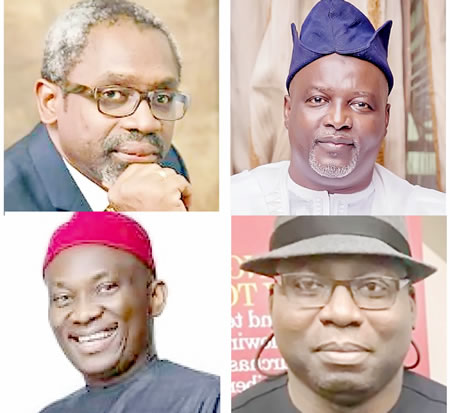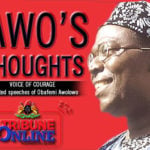The life of the ninth session of the House of Representatives began in earnest on July 6, 2019, with the issuance of the proclamation by President Muhammadu Buhari and the election of the two presiding officers: Honourable Femi Gbajabiamila (APC-Lagos) and Honourable Abubakar Bago (All Progressive Congress -Niger). Observers and analysts affirmed that it was tension-soaked, considering the calibre of returning lawmakers that threw their hat into the ring in the build-up to the keenly contested election. Before the eventual emergence of the last two-man standing, Gbajabiamila and Bago, other aspirants, who finally dropped out included the former Speaker in the eighth Assembly, Honourable Yakubu Dogara (PDP-Bauchi); Honourable Abdulrazak Namdas (APC-Adamawa), Honourable Segun Dokun Odebunmi (APC-Oyo), Honourable John Dyegh (APC-Benue), Honourable Olajiide Olatubosun (APC-Oyo), Honourable Nkeiruka Onyejeocha (APC-Abia) and Honourable Betara, among others.
One cannot forget the drama that played out during the build-up to the campaign, popularly known as the Green Card and the adopted campaign slogan of Gbajabiamila/Wase campaign team, Nation building – A joint task. However, fortune smiled on the immediate past Majority Leader, Gbajabiamila, with the overwhelming support of his estranged compatriot, Honourable Abdul Abdulmumin Jibrin (APC-Kano) who not only dropped his ambition to become the Speaker as a third term member, but volunteered to be the campaign coordinator for Gbajabiamila, as he rallied support from all the new members and the returning members of the House from all the political parties including the Peoples Democratic Party (PDP), All Progressive Grand Alliance (APGA), Alliance Democratic Party (ADC), (AA), Social Democratic Party (SDP), among others, which eventually sealed the fate of the former Speaker, Honourable Yakubu Dogara, who had tactically threw his weight behind other vested interests in the contest.
Agenda setting
The ninth Speaker of the House of Representatives, Honourable Gbajabiamila, performed his first official assignment with an assurance to be accountable, transparent and ensure probity in line with the oath of office and allegiance he took after the election. Gbajabiamila, who polled 286 votes, emerged as the Speaker, above his rival, Umar Bago, who scored 76 votes. While promising to hold the office in trust for his colleagues across party lines, Gbajabiamila said: “I understand that I hold this office in trust for you and Nigerians. Conscious of this sacred trust, I hereby dedicate myself to the service of this Honourable House and of the good citizens of this great country, with the commitment that I shall, at all times, strive to defend the Constitution of our Republic. I equally commit myself to always observe the tenets of justice, equity and fairness in my dealings with my colleagues and to apply the ideals of transparency, probity and accountability in my management of the affairs of this Honourable House.”
As a matter of commitment towards nation building, Gbajabiamila pledged that the House would address the myriad of challenges, ranging from insecurity, poverty, corruption and other contradictions, that have held the country back and are accountable for the stunted national development. According to him, “Our country is presently confronted with a myriad of problems and it is our responsibility, as members of this institution, to set aside political, ideological and other differences that may distract us from the assignment the Nigerian people have sent us here to perform.
“There is a lot more that unite us than divide us. There is much work to be done and we must now pull together, roll up our sleeves, settle down and attend to the peoples business. Whatever political party each one of us may belong, we must be conscious of the fact that Nigerians are truly desirous of good governance and are looking to us to be the agents that will, through meaningful legislation, combat security, poverty, corruption and other problems and contradictions that have held our country back and stunted our development.
“It is this message of unity and coming together that informed the theme of our campaign. Nation Building, a joint task. We have decided to carry this theme into the operations of the ninth Assembly.
“As you can see, the logo, which embodies all parties represented in the House, will be displayed permanently behind the Speaker’s chair for all to see and as a constant reminder of what this Assembly is all about. We must remain one nation bound in freedom, peace and unity. Our vision is very simple and that is to use the legislative platform and the instrumentality of the law to make Nigeria a better and more perfect union.
“My deputy, Honourable Wase and I come with a cumulative 30 year legislative experience which we intend to deploy in making our vision a reality. It was Winston Churchill that said, ‘we make a living by what we get but we make by what we give a life…’ I found those words very profound and Honourable Wase and I intend to have fulfillment through what we will be giving for the next four years. The speaker had promised all this in his remark to his colleagues after his inauguration.”
“In this regard and so as to quickly hit the ground running, I am announcing the appointment of Hon Sanusi Rikiji, the former Speaker of Zamfara State as my Chief of Staff. Honourable Sanusi comes with a wealth of legislative experience and I believe his inclusion in this Assembly will add immense value. Honourable colleagues there is much work to be done in such little time. Let us roll our sleeves and get to work. Nigerians are waiting,” Gbajabiamila urged.
Power sharing
After the swearing in ceremony, work began in earnest with the appointment and compensation of his allies as chairmen of standing committees which produced 85 chairmen from APC, 20 from PDP; two from the APGA, while the Action Alliance (AA) and the Allied Progressive Movement (APM) produced one chairman each.
Unlike the immediate past Assembly, which had soured relationship with President Buhari’s administration, the ninth session of the House and the Senate has so far witnessed a symbiotic relationship with the executive, with the passage of two critical socio-economic bills: the Finance bill and the passage of the 2020 Appropriation Bill worth N10.59 trillion, the largest so far in the history of the nation. Of note is the fact that the commitment of the Gbajabiamila-led Assembly towards returning Nigeria’s budget cycle back to January – December budgeting system in tandem with the provisions of relation sections of the 1999 Constitution (as amended). Nigerians also acknowledged the efforts made by the House to pass the budget of the various ministries, departments and agencies (MDAs) within time record, as well as prompt discharge of responsibilities by various standing and ad-hoc committees, which held public hearing and interactive sessions with stakeholders across the country.
Special interventions
Also at the commencement of the session, while unveiling the legislative agenda of the ninth Assembly, Gbajabiamila introduced the recitation of the National Pledge at the commencement of the plenary, each day, in order to inculcate a sense of patriotism in members which is now entrenched in the tradition of the House.
During the period under review, the leadership of the House summoned the nation’s service chiefs, including the Inspector General of Police, following worsening security situation in the country. At the start, the service chiefs did not take the meeting serious as they sent their subordinates to represent them, except for the police boss who came personally. The development irked the Speaker, who sent them away and gave the service chiefs a new date and they eventually turned up for the meeting during which pressing security issues were ironed out amicably.
It is on record that the House also played prominent role during the recent xenophobic attacks on Nigerians in South Africa. The House, apart from passing a resolution to support the Federal Government’s action on the development, also summoned officials of the Foreign Affairs Ministry and those of the Diaspora Commission for consultations, which helped in no small in resolving the crisis. It capped it all by organising a special plenary session in honour of Chief Allen Onyema, the Chief Executive Officer of the Air Peace Airlines, who volunteered to evacuate Nigerians from South Africa, free of charge.
Of note also was the presence of the Speaker at the defence session of the 2020 budget by the ministries, departments and agencies (MDAs) of the government before the House committees which was said to the first of its kind. During the budget defence sessions, Gbajabiamila did not only attend but also took an active part in the proceedings of all the committees which further contributed to the speedy passage of the budget. He also insisted that all sessions were held openly to allow press coverage.
The House, within the short period, also ensured industrial harmony in the country as it waded into such labour matters as in the case of the Senior Staff Association of Nigerian Universities (SSANU) and Non-Academic Staff Union and other associated institutions (NASU) which planned a nationwide industrial action that could have led to the disruption of the universities academic calendars, in the health sector in the case between the Federal Government and the National Association of Resident Doctors (NARD), which made the association to suspend its planned strike action and of late that of the electricity workers’ union during which the national grid was shut down and the entire was in total darkness for 24 hours.
In the financial sector, the House stopped the Central Bank of Nigeria (CBN) from the implementation of the cashless policy on deposits and withdrawals above N500,000 by individual and N3 million for corporate organisation through the adoption of a motion sponsored by Honourable Benjamin Kalu, chairman, House Committee on Media and Public Affairs entitled: Need to suspend the implementation of the cashless policy on deposits by the Central Bank of Nigeria, CBN.
The prolonged crisis between the members of the Islamic Movement in Nigeria (IMN), seeking for the release of their leader, Sheikh Ibrahim El- Zakzaky and the security forces was also addressed under the period as the members of the dreaded sect shifted their battles to the National Assembly and disrupted all normal activities during which an assistant commissioner of police and several others were killed.
The House equally intervened in both the crises that rocked Edo and Bauchi states Houses of Assembly as part of its oversight functions which led to the peaceful resolution of the crisis in the Bauchi State House of Assembly, while that of the Edo Assembly lingers till date.
However, the ninth Assembly within the last six months witnessed the demise of at least six members, while some members, including the House leader Honourable Ado Dogua, lost their seats through election petition tribunals
On the opposition side, one cannot forget easily the yet-to-be resolved crisis borne out of the emergence of Honourable Ndidi Elumelu as the Minority Leader; Honourable Toby Okechukwu as the deputy Minority Leader and others as against the desire of the leadership of the PDP.
While the PDP leadership, via its formal communication unilaterally appointed Honourable Kingsley Chinda as the Minority Leader of the House, minority political parties in the House settled for Elumelu through a resolution communicated to the Speaker and read at the plenary.
However, despite the cordial working relationship between the legislature and the executive, President Buhari, had accused the National Assembly of misappropriating a whooping sum of N1 trillion, allegedly released for the implementation of constituency projects, which he simply described as ‘a waste’. As expected aggrieved members of the House led by the Minority Leader, Honourable Elemelu, protested and eventually, through a motion recently passed by the House, threatened to initiate a legal process against the chairman of the Independent Corrupt Practices and Other Related Offences Commission (ICPC), Professor Bolaji Owasanoye, if he failed to provide substantive evidence of the alleged N1 trillion released to members of the National Assembly.
Giving an insight into the smooth sailing of the ninth session of the House, two members who played major roles in the emergency of the Speaker, Honourable Olubunmi Tunji-Ojo, chairman, House Committee of the Niger Delta Development Commission (NDDC) and Honourable Akeem Adeyemi, chairman, House Committee on Telecommunications, said the success that had been recorded so far was a tip of the iceberg.
According to Honourable Adeyemi, who was the South-West coordinator for Gbajabiamila for Speaker, “I have always been a party man and luckily, the person that the party brought is a brother I love so much. He has been one of the most experienced legislators Nigeria has ever had. He had the highest number of motions and bills on the floor since 1999. Having him as a role model, coupled with what the party wanted, made my work easier. In 2015 when he narrowly lost by five votes, people like us did not desert him. We believed in him and stood by him and in 2019, he won. This is the first time that the difference between the winner and the loser will be more than 200 votes. It shows the acceptability of Femi Gbajabiamila.
On his part, Honourable Tunji-Ojo who coordinated the new members-elect in the ninth session across the parties declared that it was a thing of joy to witness the wonderful happenings at the green chamber under Gbajabiamila. To him, the best is yet to come because of other reforms on the card.






